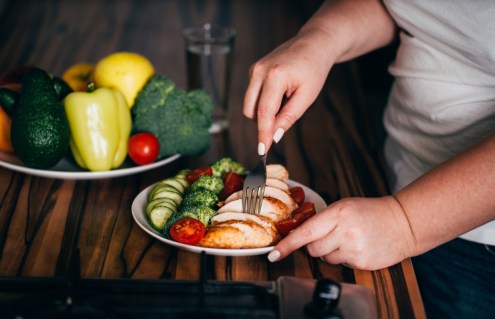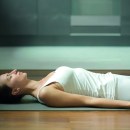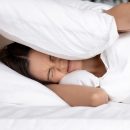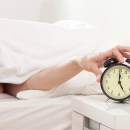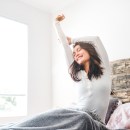5 tips to beat the top ‘Summer Sleep Stealers’
Struggling to get some shut-eye? Sleep expert Rob Hobson has teamed up with Yakult to help you sleep better this summer...
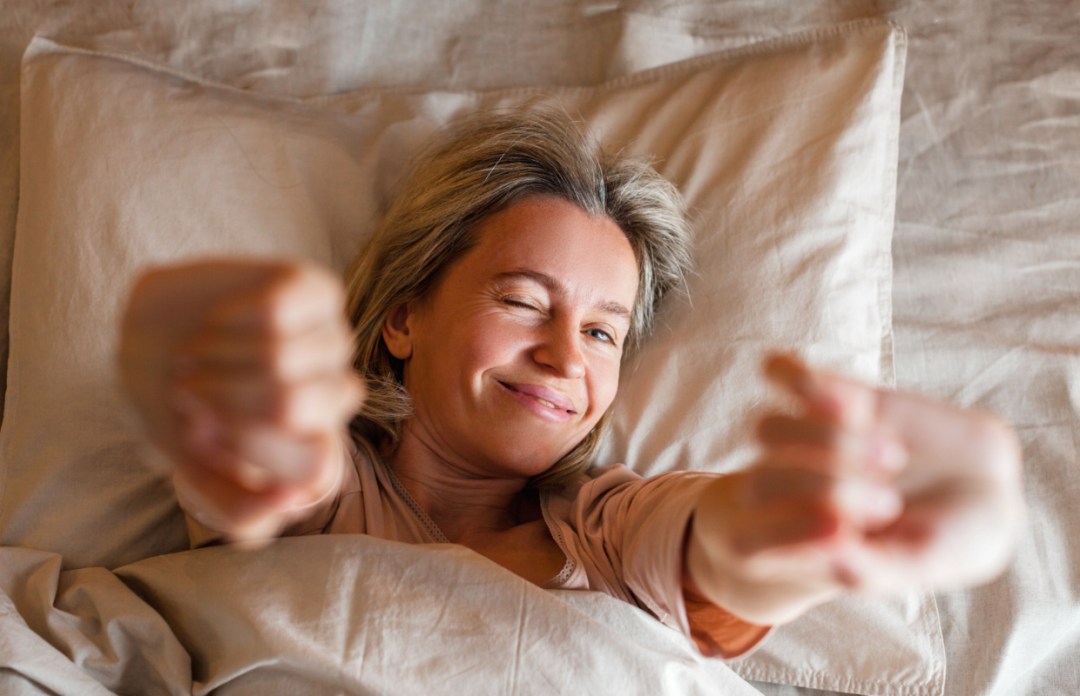
Sponsored by Yakult
With over half of Brits experiencing more disturbed slumber in the summer, Yakult has teamed up with sleep expert Rob Hobson to share tips to avoid the top ‘sleep stealers’.
Good gut health could support quality sleep and getting enough sleep could support good gut health. Here, Rob shares simple, effective ways to look after both – so you can get more zzz’s in the warmer months.

1. Eat plenty of foods that support sleep
Eating a balanced diet can help support your gut health, which can, in turn, improve sleep quality[i]. The quality of your sleep can also be directly influenced by the type of foods you eat.
Magnesium activates the parasympathetic nervous system, which is responsible for relaxation[ii]. The is present in leafy vegetables, nuts and seeds. Tryptophan helps to make melatonin – the sleep hormone – in the brain. It’s found in oily fish, chicken and oats. You can partner foods that are rich in tryptophan with carbohydrates to improve their uptake into the brain[iii]. Vitamin B6 found in foods such as salmon, chickpeas and avocado are also involved in melatonin production, which regulates the sleep-wake cycle.
These foods can be combined to create delicious ‘summer sleep’ dishes such as barbecued salmon, with savoury rice, or jerk-marinated tofu steaks. Serve with a leafy salad, nuts and seeds for extra “sleep nutrients” as well as gut health benefits from the high fibre content.
2. Keep it cool and dark
Our exposure to light and dark has an impact on how well we sleep. Light has a powerful effect on the circadian rhythm, and darkness stimulates the pineal gland to secrete melatonin.
This helps regulate your circadian rhythm so that you feel sleepy at night and wake up when there’s light.[iv] The circadian rhythm is a 24-hour cycle that helps to set your sleep pattern by controlling the flow of hormones and other biological processes.
During the summer, the evenings are brighter and longer, making it challenging to sleep. To help, make sure your curtains are well-fitted, and keep them shut with a few pegs if this is a problem. If the temperature gets sweltering, keep your curtains or blinds closed during the day and the window open – to block out light and keep the air moving.
A few people have air conditioning in their homes, but you can create your own by placing a bottle of frozen water in front of your fan to cool the air.
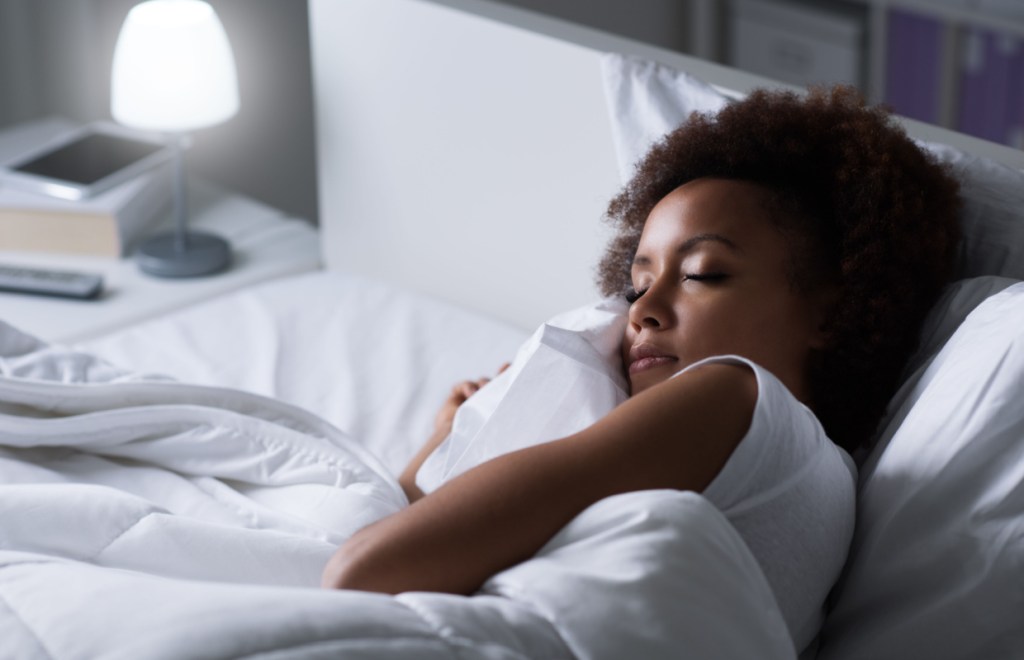
3. Control your body temperature
Ditch the duvet and replace it with a cotton sheet to help regulate your body temperature. Cotton bed wear will not only help keep you cool, but also wick any sweat off your skin and act as a barrier between you and your bed sheets.
While it may seem counterintuitive, taking a warm shower can help you cool down ahead of sleep[v]. During the evening, your body temperature drops in accordance with your circadian rhythm and melatonin is released to prepare you for sleep. This drop is 2 to 3 degrees which initiates a good night’s sleep[vi]. Taking a warm shower an hour or so before bed boosts circulation to direct heat from our core to the hands and feet where it is expelled. This process makes you sleepy and ready for bed.
4. Find strategies to manage your alcohol intake
Alcohol is a sleep marauder. It causes disruptions to specific sleep cycle stages, dehydration, and frequent bathroom visits during the night[vii]. However, this doesn’t mean that you have to completely give up drinking. Instead, find strategies to drink less alcohol to improve your sleep.
Switch to low-alcohol drinks in place of your usual order, or between alcoholic drinks. Or water down your drinks by mixing with soda water. Non-alcoholic spirit options can also be made to look like their alcoholic counterparts with fruit and ice.
To combat feeling dehydration, which can impact your gut and how well you feel, don’t forget to drink water between alcoholic drinks too!
5. Manage your stress
One of the most common reasons people cannot sleep is stress[viii]. The anxiety associated with stress can also build up as you lie awake worrying about the day ahead or reflecting on your thoughts. Get it all out by jot down what’s on your mind on a notepad with some workable solutions.
If you wake up and start feeling anxious or stressed, try breathing exercises. One simple one is to breathe in for six seconds, then hold for six seconds before breathing out for six seconds. Repeat this several times until you start feeling more relaxed.
For more information, please visit yakult.co.uk


[i] Smith, R. P., Easson, C., Lyle, S. M., Kapoor, R., Donnelly, C. P., Davidson, E. J., Parikh, E., Lopez, J. V., & Tartar, J. L. (2019). Gut microbiome diversity is associated with sleep physiology in humans. PloS one, 14(10), e0222394. https://doi.org/10.1371/journal.pone.0222394
[ii] Zhang, Y., Chen, C., Lu, L., Knutson, K. L., Carnethon, M. R., Fly, A. D., Luo, J., Haas, D. M., Shikany, J. M., & Kahe, K. (2022). Association of magnesium intake with sleep duration and sleep quality: findings from the CARDIA study. Sleep, 45(4), zsab276. https://doi.org/10.1093/sleep/zsab276
[iii] Benton, D., Bloxham, A., Gaylor, C., Brennan, A., & Young, H. A. (2022). Carbohydrate and sleep: An evaluation of putative mechanisms. Frontiers in nutrition, 9, 933898. https://doi.org/10.3389/fnut.2022.933898
[iv] Blume, C., Garbazza, C., & Spitschan, M. (2019). Effects of light on human circadian rhythms, sleep and mood. Somnologie : Schlafforschung und Schlafmedizin = Somnology : sleep research and sleep medicine, 23(3), 147–156. https://doi.org/10.1007/s11818-019-00215-x
[v] Haghayegh, S., Khoshnevis, S., Smolensky, M. H., Diller, K. R., & Castriotta, R. J. (2019). Before-bedtime passive body heating by warm shower or bath to improve sleep: A systematic review and meta-analysis. Sleep medicine reviews, 46, 124–135. https://doi.org/10.1016/j.smrv.2019.04.008
[vi] Kräuchi, K., Cajochen, C., Werth, E., & Wirz-Justice, A. (2000). Functional link between distal vasodilation and sleep-onset latency?. American journal of physiology. Regulatory, integrative and comparative physiology, 278(3), R741–R748. https://doi.org/10.1152/ajpregu.2000.278.3.R741
[vii] Park, S. Y., Oh, M. K., Lee, B. S., Kim, H. G., Lee, W. J., Lee, J. H., Lim, J. T., & Kim, J. Y. (2015). The Effects of Alcohol on Quality of Sleep. Korean journal of family medicine, 36(6), 294–299. https://doi.org/10.4082/kjfm.2015.36.6.294
Colrain, I. M., Nicholas, C. L., & Baker, F. C. (2014). Alcohol and the sleeping brain. Handbook of clinical neurology, 125, 415–431. https://doi.org/10.1016/B978-0-444-62619-6.00024-0
[viii] Han, K. S., Kim, L., & Shim, I. (2012). Stress and sleep disorder. Experimental neurobiology, 21(4), 141–150. https://doi.org/10.5607/en.2012.21.4.141
ix Madison, A., & Kiecolt-Glaser, J. K. (2019). Stress, depression, diet, and the gut microbiota: human-bacteria interactions at the core of psychoneuroimmunology and nutrition. Current opinion in behavioral sciences, 28, 105–110. https://doi.org/10.1016/j.cobeha.2019.01.011

